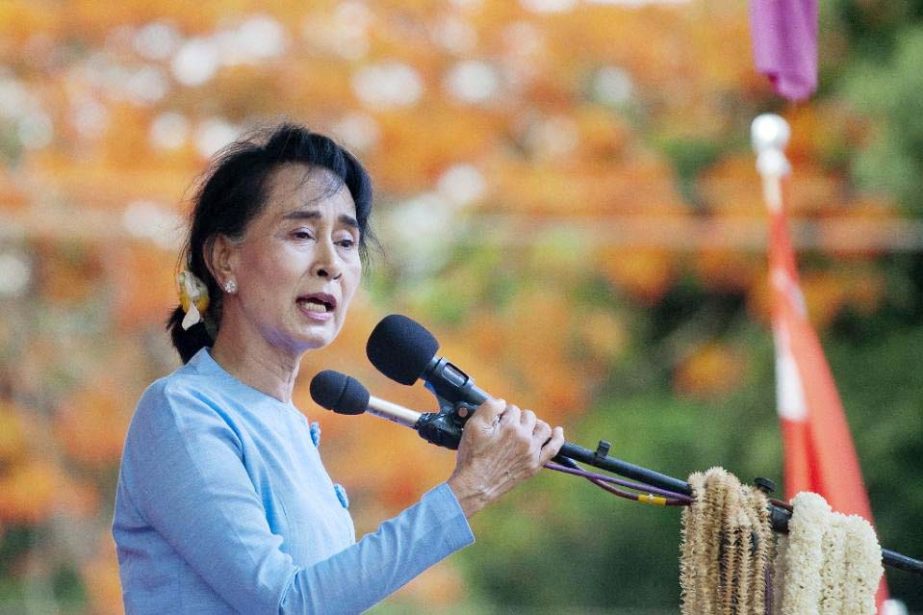
AFP, Naypyidaw :
Myanmar’s parliament Thursday dealt a decisive blow to Aung San Suu Kyi’s hopes of amending the junta-era constitution that bars her from the presidency ahead of landmark elections, voting down a bill that would have ended the military’s effective veto on charter change.
The vote, held after three days of energetic debate between uniformed soldiers and elected MPs, saw parliament shoot down a draft amendment that would have chipped away at the military’s political stranglehold.
Myanmar’s parliament continues to be dominated by the army and former generals despite reforms since the end of outright junta rule in 2011. Observers say the military is extremely reluctant to allow any further reduction to its powers.
The 436 amendment bill was “not enacted”, parliamentary speaker Shwe Mann told the legislature after the 388 votes in favour of change fell below the threshold of 75 percent of all lawmakers needed for it to pass.
The result virtually extinguishes Suu Kyi’s chances of the presidency at this stage because of a provision excluding those with foreign children from the top office.
Speaking directly after the result Suu Kyi urged Myanmar’s people not to “lose hope” after the failure to amend any major parts of the constitution.
Striking a note of defiance, she also vowed the opposition would not “back down” from elections slated for October or November.
The polls are likely to see Suu Kyi’s National League for Democracy hoover up seats, if they are free and fair, and are seen as a crucial test of the country’s democratic transition.
The clause blocking Suu Kyi’s pathway to the presidency was not up for debate in the draft bills before parliament Thursday.
But debate was dominated by proposals to change clause 436, which demands that 75 percent of parliamentarians must vote for major constitutional changes, ensuring that unelected soldiers have the final say.
Despite the expectation that the bill would not pass, the legislature fell into silence as the results were announced, with several other proposed amendments also voted down.
Several senior MPs for the NLD, which garnered five million signatures in a petition on changing 436 last year, appeared visibly upset.
Military MPs have lined up to argue against the proposal to reduce the voting threshold on constitutional amendment to 70 percent, with analysts saying they fear trimming their own powers.
Brigadier General Tin San Naing told reporters earlier Thursday that the proposed change to 436 was “not suitable” because “our democracy is still in a nascent stage”.
Observers say the army is deeply wedded to its perceived role as the protector of the Myanmar constitution, which was drawn up under a former military regime that suppressed all dissent and kept Suu Kyi under lock and key for some 15 years.
Myanmar’s parliament Thursday dealt a decisive blow to Aung San Suu Kyi’s hopes of amending the junta-era constitution that bars her from the presidency ahead of landmark elections, voting down a bill that would have ended the military’s effective veto on charter change.
The vote, held after three days of energetic debate between uniformed soldiers and elected MPs, saw parliament shoot down a draft amendment that would have chipped away at the military’s political stranglehold.
Myanmar’s parliament continues to be dominated by the army and former generals despite reforms since the end of outright junta rule in 2011. Observers say the military is extremely reluctant to allow any further reduction to its powers.
The 436 amendment bill was “not enacted”, parliamentary speaker Shwe Mann told the legislature after the 388 votes in favour of change fell below the threshold of 75 percent of all lawmakers needed for it to pass.
The result virtually extinguishes Suu Kyi’s chances of the presidency at this stage because of a provision excluding those with foreign children from the top office.
Speaking directly after the result Suu Kyi urged Myanmar’s people not to “lose hope” after the failure to amend any major parts of the constitution.
Striking a note of defiance, she also vowed the opposition would not “back down” from elections slated for October or November.
The polls are likely to see Suu Kyi’s National League for Democracy hoover up seats, if they are free and fair, and are seen as a crucial test of the country’s democratic transition.
The clause blocking Suu Kyi’s pathway to the presidency was not up for debate in the draft bills before parliament Thursday.
But debate was dominated by proposals to change clause 436, which demands that 75 percent of parliamentarians must vote for major constitutional changes, ensuring that unelected soldiers have the final say.
Despite the expectation that the bill would not pass, the legislature fell into silence as the results were announced, with several other proposed amendments also voted down.
Several senior MPs for the NLD, which garnered five million signatures in a petition on changing 436 last year, appeared visibly upset.
Military MPs have lined up to argue against the proposal to reduce the voting threshold on constitutional amendment to 70 percent, with analysts saying they fear trimming their own powers.
Brigadier General Tin San Naing told reporters earlier Thursday that the proposed change to 436 was “not suitable” because “our democracy is still in a nascent stage”.
Observers say the army is deeply wedded to its perceived role as the protector of the Myanmar constitution, which was drawn up under a former military regime that suppressed all dissent and kept Suu Kyi under lock and key for some 15 years.

